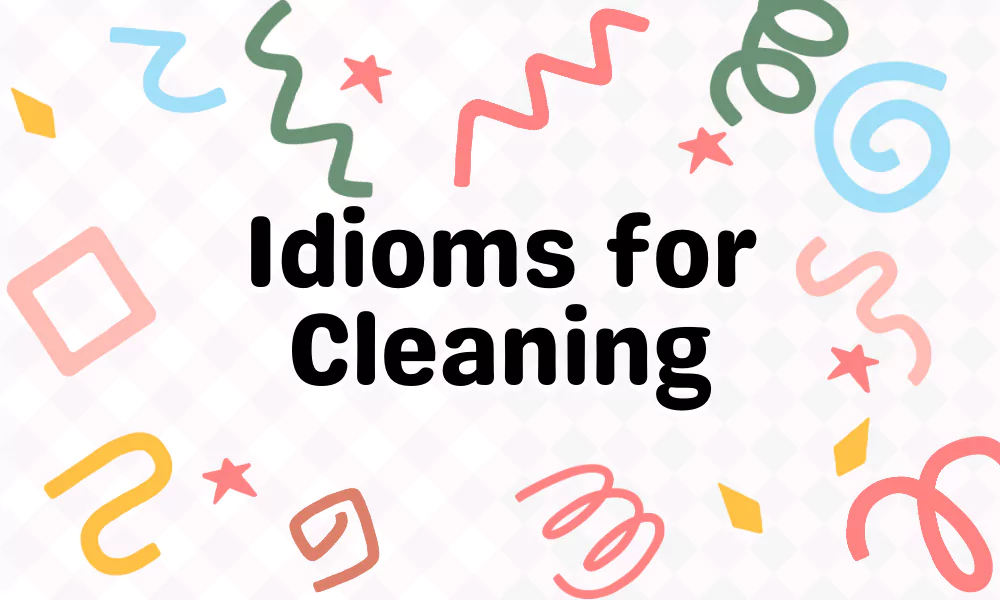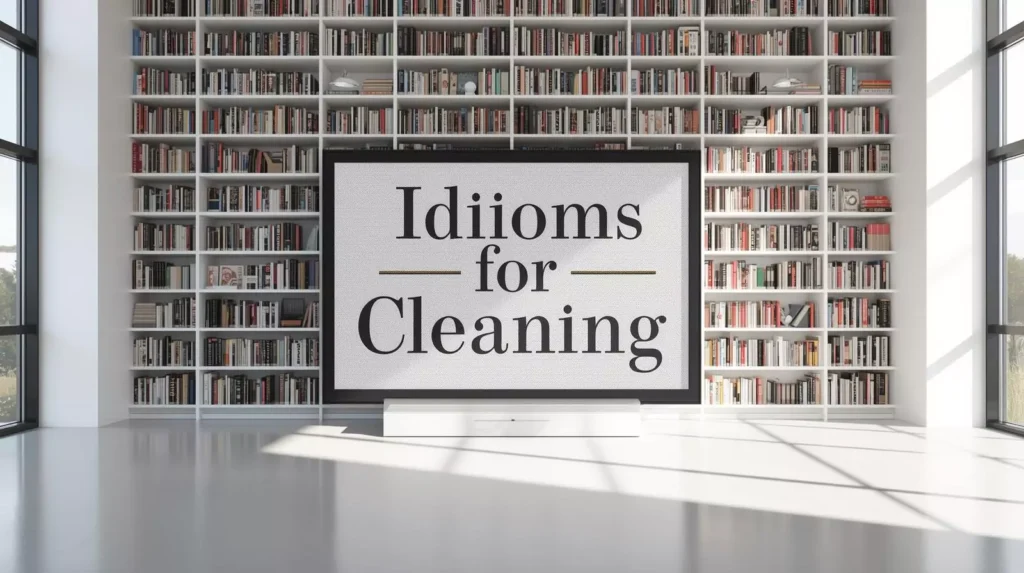Idioms for Cleaning – Expressions of Fresh Starts and Tidiness

Language is full of idioms, those colorful expressions that don’t always mean exactly what the words say. Cleaning idioms are a perfect example. While they may sound like they’re about dusting, scrubbing, or tidying up, their meanings often go much deeper. These phrases are used to talk about fresh starts, solving problems, organizing life, or even moral behavior. From “clean slate” to “sweep it under the rug,” cleaning idioms add sparkle and creativity to everyday conversations.
What Are Idioms for Cleaning?
Idioms for cleaning are expressions that use the idea of cleaning, tidying, or organizing to describe situations in life. They don’t usually refer to actual cleaning but instead carry a figurative meaning. For example, saying someone is “starting with a clean slate” means they are beginning fresh without any past mistakes, not that they are literally wiping a board. These idioms are commonly used in everyday language to talk about making changes, solving problems, or improving situations.

Commonly Used Idioms for Cleaning
- Clean slate – A fresh start.
Example: After the move, she treated it as a clean slate to rebuild her life. - Clean up one’s act – To improve behavior.
Example: He had to clean up his act before applying for the new job. - Clean sweep – A complete victory or removal.
Example: The team made a clean sweep of all the trophies this year. - Clean as a whistle – Spotless or innocent.
Example: The kitchen was clean as a whistle after the party. - Make a clean break – To completely separate from something.
Example: She decided to make a clean break from her old habits. - Clean bill of health – A report of good health.
Example: The doctor gave him a clean bill of health. - Come clean – To confess or admit the truth.
Example: It’s time to come clean about what really happened. - Wipe the slate clean – To forget past mistakes.
Example: They agreed to wipe the slate clean and start again. - As clean as a hound’s tooth – Extremely clean or honest.
Example: His reputation was as clean as a hound’s tooth. - Clean break – A complete and clear separation.
Example: After the argument, she made a clean break. - Spring cleaning – Major cleaning or organizing.
Example: We did a spring cleaning of the garage last weekend. - Clean conscience – A feeling of being guilt-free.
Example: She slept well knowing she had a clean conscience. - Squeaky clean – Perfectly clean or morally upright.
Example: The celebrity maintained a squeaky-clean image. - Clean house – To eliminate unnecessary things or people.
Example: The new manager came in ready to clean the house. - Clean break from the past – To move on completely.
Example: College gave him a clean break from the past. - Keep your nose clean – Stay out of trouble.
Example: He’s been keeping his nose clean since the incident. - Sweep something under the rug – To hide or ignore a problem.
Example: They tried to sweep the scandal under the rug. - Polish off – To finish something quickly.
Example: They polished off the entire cake in minutes. - Spick and span – Very neat and clean.
Example: Her room was always spick and span. - Tidy up – To make something neat.
Example: He tidied up the desk before the meeting. - Clean getaway – Escape without being caught.
Example: The thief made a clean getaway. - Mop up – To finish or complete something.
Example: Soldiers had to mop up after the battle. - Air your dirty laundry – To reveal private problems publicly.
Example: They aired their dirty laundry during the debate. - In the wash – Something that will be revealed eventually.
Example: Don’t worry, the truth will come out in the wash. - Clean up – To make a big profit or succeed.
Example: She cleaned up at the casino last night. - Scour something clean – To clean thoroughly.
Example: He scoured the pan clean after cooking. - Dust off – To bring something back into use.
Example: She dusted off her old guitar. - Sweep aside – To dismiss or ignore.
Example: His concerns were swept aside by the manager. - Wash one’s hands – To stop being involved.
Example: He washed his hands of the matter completely. - Scrub up well – To look good after dressing up.
Example: He really scrubs up well for formal events. - Clear the air – To resolve tension.
Example: They had a talk to clear the air. - Throw out the trash – To get rid of unwanted things.
Example: It’s time to throw out the trash from your life. - Brush off – To dismiss or ignore.
Example: He brushed off the criticism. - Sweep through – To move quickly and efficiently.
Example: She swept through the room, organizing everything. - Clean slate policy – Starting fresh in work or rules.
Example: The company introduced a clean slate policy for employees. - Clean hands – Innocent of wrongdoing.
Example: He insisted his hands were clean in the deal. - Soapbox speech – Speaking passionately in public.
Example: She got on her soapbox about recycling. - Clean living – A lifestyle of health and morality.
Example: He credits his longevity to clean living. - Dust settled – After chaos has ended.
Example: Once the dust settled, they could plan ahead. - Brush up on – To improve skills.
Example: He brushed up on his English before the test. - Clean break emotionally – To detach feelings.
Example: Therapy helped her make a clean break emotionally. - Rinse and repeat – To do again.
Example: Just follow the steps: rinse and repeat. - Clean-cut – Neat and respectable.
Example: He had a clean-cut appearance. - Clean sweep in politics – Winning all seats.
Example: The party made a clean sweep in the election. - Clean off the table – To finish eating and clear the dishes.
Example: Please clean off the table after dinner. - Sweep the floor with someone – Defeat easily.
Example: The champion swept the floor with his opponent. - Clean image – A good reputation.
Example: She worked hard to maintain a clean image. - Clean break financially – To clear debts or start over.
Example: Bankruptcy gave him a clean break financially. - Clean kitchen metaphor – Symbol of orderliness.
Example: She always wanted her life like a clean kitchen. - Clean mind – Pure thoughts or intentions.
Example: Meditation helps keep a clean mind.
Rare and Unique Idioms for Cleaning
- Scrubbed from memory – To forget something deliberately.
Example: The embarrassing moment was scrubbed from memory. - Sweep the cobwebs away – To refresh one’s mind.
Example: A walk in the park helped sweep the cobwebs away. - Clean out the attic (of the mind) – To let go of old ideas.
Example: He cleaned out the attic of his mind during meditation. - Polish the silver – To make final preparations.
Example: She polished the silver before the guests arrived. - Wash away sins – To cleanse guilt or mistakes.
Example: He believed charity could wash away sins. - Clean out one’s closet – To reveal hidden secrets.
Example: The biography cleaned out many closets. - Dust bunnies of the mind – Small neglected problems.
Example: Therapy helped her face the dust bunnies of her mind. - Sweep the floor of doubt – To remove hesitation.
Example: His encouragement swept the floor of doubt. - Soap away worries – To relieve stress.
Example: A hot shower helped soap away her worries. - Shine the windows of the soul – To seek clarity.
Example: Reading poetry shined the windows of her soul.
Cleaning Idioms in Literature and Pop Culture
- “Clean slate” (used in countless novels/films) – A new beginning.
Example: In Batman Begins, Bruce Wayne sought a clean slate for Gotham. - “Air dirty laundry” – Publicly reveal secrets.
Example: Reality shows often air contestants’ dirty laundry. - “Sweep it under the rug” – Hide problems.
Example: In Mad Men, scandals were often swept under the rug. - “Spring cleaning” – Renewal or fresh start.
Example: Self-help books often use “spring cleaning” as a metaphor for life changes. - “Wipe the slate clean” – Forget past mistakes.
Example: In Les Misérables, Jean Valjean tries to wipe the slate clean after prison. - “Clean hands” – Innocence in law/politics.
Example: Court dramas often focus on whether someone has clean hands. - “Squeaky clean image” – A wholesome reputation.
Example: Disney stars are often marketed with a squeaky-clean image. - “Polish off” – Finish quickly.
Example: In sitcoms, characters polish off pizza boxes in minutes. - “Clean break” – Moving on without ties.
Example: Divorce stories in films often center on making a clean break. - “Dust settled” – Calm after conflict.
Example: In war novels, peace comes when the dust has settled.
Read: Idioms for Rare

Synonyms and Alternatives for Cleaning
| Synonym | Meaning |
|---|---|
| Tidying | Making things neat and orderly.place. |
| Dusting | Removing fine dirt or particles. |
| Wiping | Cleaning by rubbing with a cloth. |
| Polishing | Making something shine. |
| Scrubbing | Cleaning with force. |
| Sweeping | Removing debris with a broom. |
| Washing | Using water and soap to clean. |
| Sanitizing | Making something hygienic. |
| Decluttering | Removing unnecessary items. |
| Refreshing | Reviving or brightening up. |
Tips for Using Cleaning Idioms in Writing and Speech
- Match the Mood – Use cleaning idioms like “wipe the slate clean” in serious contexts and lighter ones like “spick and span” in casual conversations.
- Create Imagery – Choose idioms that paint a picture. For example, “sweep it under the rug” instantly gives a visual of hiding something.
- Adapt to Situations – In professional settings, idioms like “clean up one’s act” can encourage improvement, while in storytelling, they add character depth.
- Blend with Action – Combine idioms with actual cleaning tasks for humor or emphasis. Example: “I’m not just cleaning the room; I’m wiping the slate clean.”
- Don’t Overuse – Sprinkle idioms naturally instead of crowding sentences with them. This keeps your language fresh and impactful.
Read: Idioms For The Best
FAQs
Conclusion
Cleaning idioms go far beyond dusting and scrubbing because they capture the essence of fresh starts, honesty, problem-solving, and even personal growth. From everyday phrases like “clean slate” to unique expressions such as “shine the windows of the soul,” these idioms make language richer and more engaging. By using them in writing or speech, you not only expand your vocabulary but also communicate ideas in a colorful and memorable way.
